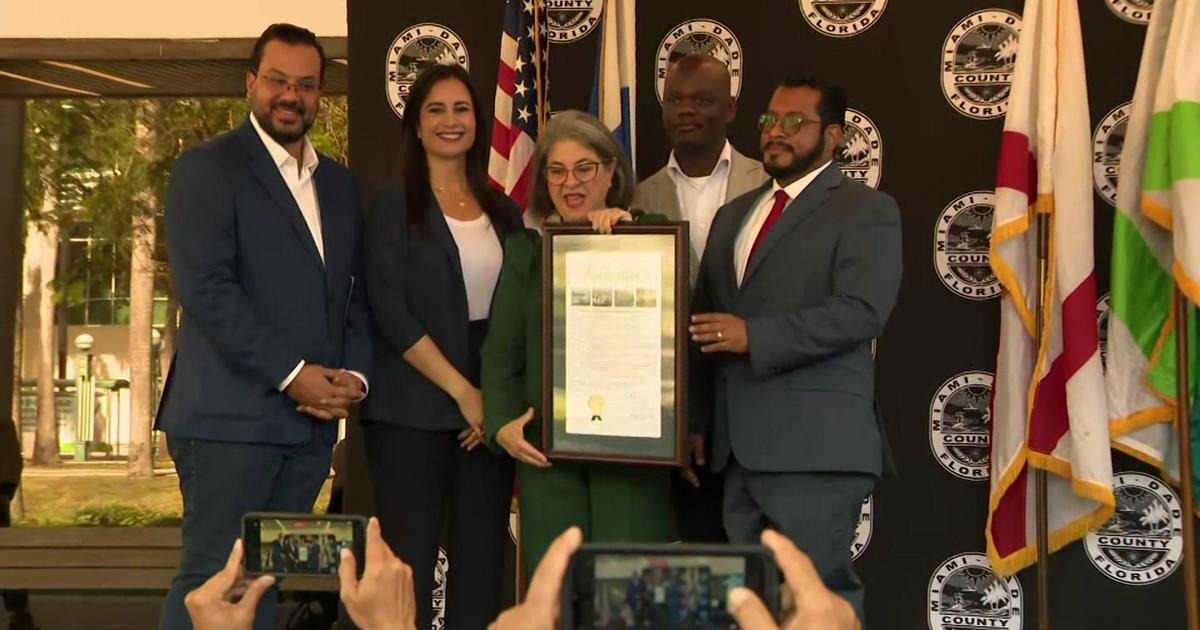Shortage Of Primary Care Doctors In Florida
MIAMI (AP) - Darlene O'Neil just saw a doctor at a mobile health clinic for the first time in months after dropping her health coverage six months ago because she could no longer afford it. Soon, a team of local student doctors, nurses, lawyers and social workers led by a doctor will visit her home for monthly follow-up care to help the 46-year-old her manage her blood pressure because she's at high-risk for diabetes.
Many health professionals are advocating for more medical team models like this one created by Florida International University to alleviate the shortage of primary care physicians that is expected to grow as more Floridians get insurance under the Affordable Care Act.
There is a severe shortage of doctors in much of Florida. According to the state Department of Health, 16 mostly small and rural counties have fewer than seven active physicians per 10,000 residents. That compares to 22 active physicians per 10,000 residents in the United States. The state estimates it would take at least 753 primary care physicians to eliminate those shortages.
The primary care shortage is especially dire in Alachua, Liberty, Dixie, Gadsen and Leon counties. But the pressure is also felt in neighborhoods and suburbs around Miami, Tampa and Orlando, according to rankings by federal health officials.
Experts say finding and retaining enough primary care doctors to meet these new patient demands will require a multi-layered response.
The state funded $80 million for an additional 700 residency slots this year, but Florida will still need additional residencies and fellowships just to bring the state up to the national average per capita. Many graduating physicians leave the state to finish their training because there is a shortage of Florida residency programs. Some experts are also advocating for loan forgiveness to entice medical students into primary care. Medical school graduates often end up going into more highly compensated specialty care.
Florida Atlantic University has a new internal medicine residency program that was designed to "resolve one of the direst needs for our region — the shortage of primary care physicians," said program director Dr. Bernardo Obeso.
Some medical professionals are pushing to increase the role of physician assistants and nurse practitioners so doctors are dealing less with common colds and earaches and more with acute illnesses. The model also empowers patients to take an active role in managing their health through diet and exercise and tracking their own health stats, such as blood pressure.
"That's the way medicine is going. It's not going to be 'The doctor said this,' but instead the team will work together to decide. We are moving away from this paternalistic model where doctor knows best and only the doctor tells you what to do," said Dr. Frederick Anderson, medical director of FIU's Mobile Health Center. The center has treated nearly 175 since opening last fall with a team of three rotating doctors, a nurse, a front desk manager and a driver.
That's why FIU's program is trying to hook future doctors onto this concept early in their education, so they will learn to be better collaborators, which Anderson said also leads to better patient outcomes.
But the team approach is a controversial issue and one that has some doctors feeling their power is being usurped.
In a move to maintain control, some doctors unsuccessfully pushed this year in the Legislature for a bill that would require nurses who have attained their doctoral degrees and use the title of "doctor" to state, in advertising or rendering care, that they are not medical doctors or osteopathic physicians. Violators would have been charged criminally.
The Florida Nurses Association says nurse practitioners have the education and experience to help physicians provide basic health care services and criticized the bill as a distraction from real health care issues.
Gov. Rick Scott also recently signed into law a long-debated bill that expands the drug-prescribing powers of optometrists. The state now allows optometrists to prescribe oral medications — including pills — to treat eye diseases. Lawmakers in other states are also seeking to expand the roles of nurse practitioners, optometrists and pharmacists.
Florida lawmakers voted against expanding Medicaid under the federal health law, which would have taken more than $50 billion to cover roughly 1.1 million Floridians so the state will not have an influx of new Medicaid enrollees.
However, the federal law requires all citizens to purchase health coverage or pay a roughly $100 fine the first year. Many will sign up for health insurance on the new health exchanges, an online site that should be running this fall where residents can shop and compare prices and benefits of different health plans.
It's unclear how many Floridians will purchase insurance in the exchange
Jay Millson, executive vice president of the Florida Academy of Family Physicians, also advocates for the medical home model that uses a team of staff to treat patients, but stressed it has to be a true collaboration with strong communication under the supervision of a doctor — otherwise it won't work. If a nurse practitioner is calling the shots for a patient, it will only further fragment the system, he said. But if the doctor is the quarterback, then the team approach can make the entire system more effective and efficient.
"We need to improve the system. We need to improve the infrastructure...more so than we need to just focus on churning out more primary care physicians," he said.
(© Copyright 2013 The Associated Press. All Rights Reserved. This material may not be published, broadcast, rewritten or redistributed.)



